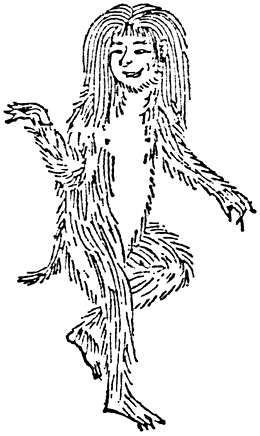A shōjō (猩々 or 猩猩) is a kind of Japanese sea spirit with red face and hair and a fondness for alcohol.
Etymology
The Chinese characters are also a Japanese (and Chinese) word for orangutan, and can also be used in Japanese to refer to someone who is particularly fond of alcohol.
The legend is the subject of a Noh play of the same name. There is a Noh mask for this character, as well as a type of Kabuki stage makeup, that bear the name.
Myth
There is a tale involving the shojo and white sake. There was a gravely sick man whose dying wish was to drink sake. His son searched for it near Mount Fuji and came across the red shojo, who were having a drinking party on the beach. The shojo gave him some sake after listening to his plea. Since the sake revived the dying father, the son went back to the spirit to get more sake each day for five days. A greedy neighbor who also wanted the sake became sick after drinking it. He forced the son to take him to the shojo to get the good sake. The shojo explained that as his heart wasn't pure, the sacred sake would not have life-restoring benefits, but instead had poisoned the neighbor. The neighbor repented, and the shojo gave him some medicine to cure him. The father and the neighbor brewed white sake together.
Art/Fiction
The kyogen-influenced Noh play shojo or shojo midare features a shojo buying sake, getting drunk and dancing ecstatically, then rewarding the sake seller by making his sake vat perpetually refill itself. The shojo from the play have been made into wooden dolls (nara ningyo), they are one of the "most common" wooden dolls derived from Noh plays. Shojo dolls are used to ward against smallpox.
In Hayao Miyazaki's animated film Princess Mononoke, talking, ape-like creatures struggling to protect the forest from human destruction by planting trees are identified as shojo.
Shojo appeared in a 2005 Japanese film The Great Yokai War.

